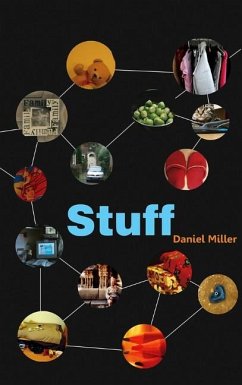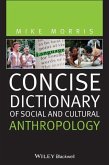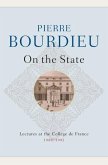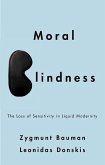Things make us just as much as we make things. And yet, unlike the study of languages or places, there is no discipline devoted to the study of material things. This book shows why it is time to acknowledge and confront this neglect and how much we can learn from focusing our attention on stuff.
The book opens with a critique of the concept of superficiality as applied to clothing. It presents the theories that are required to understand the way we are created by material as well as social relations. It takes us inside the very private worlds of our home possessions and our processes of accommodating. It considers issues of materiality in relation to the media, as well as the implications of such an approach in relation, for example, to poverty. Finally, the book considers objects which we use to define what it is to be alive and how we use objects to cope with death.
Based on more than thirty years of research in the Caribbean, India, London and elsewhere, Stuff is nothing less than a manifesto for the study of material culture and a new way of looking at the objects that surround us and make up so much of our social and personal life.
Hinweis: Dieser Artikel kann nur an eine deutsche Lieferadresse ausgeliefert werden.
The book opens with a critique of the concept of superficiality as applied to clothing. It presents the theories that are required to understand the way we are created by material as well as social relations. It takes us inside the very private worlds of our home possessions and our processes of accommodating. It considers issues of materiality in relation to the media, as well as the implications of such an approach in relation, for example, to poverty. Finally, the book considers objects which we use to define what it is to be alive and how we use objects to cope with death.
Based on more than thirty years of research in the Caribbean, India, London and elsewhere, Stuff is nothing less than a manifesto for the study of material culture and a new way of looking at the objects that surround us and make up so much of our social and personal life.
Hinweis: Dieser Artikel kann nur an eine deutsche Lieferadresse ausgeliefert werden.
"This is a unique book that comes from a unique scholar. In this one volume, one can see the power of material culture as a means to study culture and society more generally. The specifics are informative and the larger formulations profound. The writing is consistently clear - at times, endearing - and the content brilliant." -- Harvey Molotch, New York University
"Miller deftly displays a talent for the uncluttered presentation of ideas,largely eschewing complexity without compromising the integrity of his arguments. By constantly placing his fieldwork centre-stage, Miller allows the empirical realities of ethnography to bolster his key proposals and repeatedly encourages readers to question and reflect upon material culture and their relationships with their own 'stuff'".
Journal of the Anthropological Society of Oxford
"[Stuff] really is a little gem. Timely, well-written and highly accessible, it is a concise and grounded resource in the struggle to analyse the complexities of contemporary cultural life ... For undergraduates and general critical readers alike, it will be a welcome and thought-provoking reminder that the material world of things we have created, and which in turn helps to create us, needs to be understood dialectically - for better and for worse."
Times Higher Education
"[T]here are fascinating things here: a seven-page description of how a woman who wears a sari navigates daily life through the garment; a portrait of council tenants as "artists" redecorating their flats in different ways; and analyses of fashion, furnishing and "mobile phone relationships" in Jamaica. When Miller is focused on the details, the writing hums with empathetic colour and detail."
The Guardian
"This is a unique book that comes from a unique scholar. In this one volume, one can see the power of material culture as a means to study culture and society more generally. The specifics are informative and the larger formulations profound. The writing is consistently clear - at times, endearing - and the content brilliant."
Harvey Molotch, New York University
"This book fizzes and sparkles with ideas and intelligence. Professor Miller develops his dialectical theory of material culture with enviable clarity. Readers are encouraged by his captivating style and lightly-worn scholarship to the frontiers of the subject: they will never look at their stuff in the same way again."
Ray Pahl, University of Essex
Journal of the Anthropological Society of Oxford
"[Stuff] really is a little gem. Timely, well-written and highly accessible, it is a concise and grounded resource in the struggle to analyse the complexities of contemporary cultural life ... For undergraduates and general critical readers alike, it will be a welcome and thought-provoking reminder that the material world of things we have created, and which in turn helps to create us, needs to be understood dialectically - for better and for worse."
Times Higher Education
"[T]here are fascinating things here: a seven-page description of how a woman who wears a sari navigates daily life through the garment; a portrait of council tenants as "artists" redecorating their flats in different ways; and analyses of fashion, furnishing and "mobile phone relationships" in Jamaica. When Miller is focused on the details, the writing hums with empathetic colour and detail."
The Guardian
"This is a unique book that comes from a unique scholar. In this one volume, one can see the power of material culture as a means to study culture and society more generally. The specifics are informative and the larger formulations profound. The writing is consistently clear - at times, endearing - and the content brilliant."
Harvey Molotch, New York University
"This book fizzes and sparkles with ideas and intelligence. Professor Miller develops his dialectical theory of material culture with enviable clarity. Readers are encouraged by his captivating style and lightly-worn scholarship to the frontiers of the subject: they will never look at their stuff in the same way again."
Ray Pahl, University of Essex








